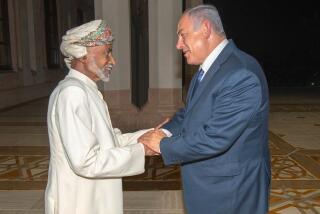U-2 Spy Plane Makes 4-Hour Flight, Iraq Says
- Share via
BAGHDAD — The first of the U-2 spy plane flights long demanded by the United Nations to aid weapons inspectors in Iraq took place Monday, the Foreign Ministry announced, in what appeared to be the latest sign that Baghdad wishes to appear more cooperative.
“At 11:55 a.m., a U-2 surveillance plane entered Iraqi airspace and reconnoitered several areas of Iraq and left Iraqi airspace at 4:15 p.m.,” the ministry said in a statement. “The reconnaissance operation lasted 4 hours and 20 minutes.”
Iraq agreed to allow U-2 flights Feb. 10, after a visit to Baghdad by chief U.N. weapons inspectors Hans Blix and Mohamed ElBaradei. The two had pressed authorities to cooperate more with inspectors or risk a negative report on their compliance to the U.N. Security Council that could spell war with the United States.
The inspectors argued that surveillance by the high-flying aircraft over targeted areas could help verify or disprove U.S. claims that Iraq has been moving banned weapons and materials to elude detection by monitors.
As late as Sunday, Baghdad was insisting on conditions for the U-2 flights that U.N. officials considered unacceptable. In addition to wanting 48 hours’ notice of flights, the Iraqis demanded details of the flight plans, including routes, speeds and altitudes, and the call signs of the flights.
“Iraq wants to know where the U-2 is,” a diplomatic source said Sunday. In light of that demand, he added, “U-2 flights are by no means certain.”
It was not immediately clear Monday how those issues were resolved. The Foreign Ministry statement did not indicate what areas of Iraq were covered by the U-2 flight path.
‘Prior Notification’
The U.N. inspectors’ spokesman in Baghdad, Hiro Ueki, said late Monday that he could not confirm that a surveillance flight had taken place.
However, he said U.N. headquarters had provided Iraq with a time frame when a flight might take place.
“We gave them prior notification about the window,” he said. “And we anticipated that it would fly.”
For months, Iraqi officials resisted the U-2 flights, saying Baghdad could not ensure their safety while U.S. and British planes patrol “no-fly” zones over northern and southern Iraq. Baghdad often fires on those patrols with antiaircraft guns and missiles. Iraq did permit U-2 flights during the previous U.N. inspection mission, which ended in 1998.
Although Blix and ElBaradei have insisted that Iraq give ground on the U-2 issue and two other points -- private interviews with Iraqi scientists and legislation, finally passed Friday, banning weapons of mass destruction -- both say their real bottom line is “substantive” information from Iraq that answers questions about its weapons programs.
Iraq asserts that it disposed of its stockpiles of anthrax, VX nerve agent and mustard gas and their components, but it says it has no way to prove the destruction of these substances through physical or documentary evidence.
Issue of Interviews
Without such proof, the diplomatic source said, frank and in-depth interviews with Iraqi scientists involved in the nation’s weapons programs are the only possible “last line of defense” for the inspectors to determine whether the Iraqi authorities are telling the truth.
So far, however, inspectors feel they are not getting enough cooperation. Iraq said last week that it would “encourage” scientists to cooperate.
But scientists have refused to be interviewed unless they are allowed to bring tape recorders. U.N. officials here suspect that the demand originates with the Iraqi government and that the tapes are to be turned over to Iraqi authorities.
“We were surprised” at the requests for tape recorders by scientists, a U.N. source said. “They are afraid. There is no question about that.”
Another looming issue is whether Iraq will agree to destroy Al-Samoud 2 missiles that Blix, in a report Friday to the Security Council, concluded were forbidden because they exceed the permitted range of 93 miles.
On Sunday, U.N. inspectors began tagging Al-Samoud 2 missiles in preparation for a possible order for them to be destroyed.
If Iraq refuses to dispose of the missiles, that would probably become another issue cited by the U.S. and Britain to argue for military action against Baghdad for refusing to cooperate.
Although destroying the Al-Samouds would be evidence of cooperation with U.N. inspectors, officials here believe that Iraq might be reluctant to surrender the missiles -- which can be used for defensive purposes -- at a time when it feels it is under imminent threat of attack.
More to Read
Sign up for Essential California
The most important California stories and recommendations in your inbox every morning.
You may occasionally receive promotional content from the Los Angeles Times.













